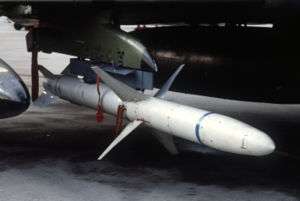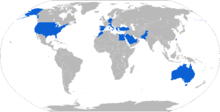AGM-88 HARM
The AGM-88 HARM (High-speed Anti-Radiation Missile) is a tactical, air-to-surface anti-radiation missile designed to home in on electronic transmissions coming from surface-to-air radar systems. It was originally developed by Texas Instruments as a replacement for the AGM-45 Shrike and AGM-78 Standard ARM system. Production was later taken over by Raytheon Corporation when it purchased the defense production business of Texas Instruments.
| AGM-88 HARM[1] | |
|---|---|
 An AGM-88 loaded on an F-4 Phantom | |
| Type | Air-to-surface antiradiation missile |
| Place of origin | United States |
| Service history | |
| In service | 1985–present |
| Used by | U.S. and others |
| Wars | Gulf War, Kosovo War, Iraq War, 2011 military intervention in Libya |
| Production history | |
| Designer | Texas Instruments |
| Designed | 1983 |
| Manufacturer | Texas Instruments, then Raytheon Corporation (AGM-88) Orbital ATK and Northrop Grumman (AGM-88E) |
| Unit cost | US$284,000 US$870,000 for AGM-88E[2] |
| Produced | 1983–present |
| Specifications | |
| Mass | 355 kilograms (783 lb) |
| Length | 4.1 metres (13 ft) |
| Diameter | 254 millimetres (10.0 in) |
| Warhead | WDU-21/B blast/fragmentation in a WAU-7/B warhead section, and later WDU-37/B blast-fragmentation warhead. |
| Warhead weight | 66 kilograms (146 lb) |
Detonation mechanism | FMU-111/B laser proximity fuze |
| Engine | Thiokol SR113-TC-1 dual-thrust rocket engine |
| Wingspan | 1.1 metres (3.6 ft) |
| Propellant | Solid fuel |
Operational range | 150 kilometres; 92 miles (80 nmi) |
| Maximum speed | 2,280 km/h (1,420 mph) (Mach 1.84) |
Guidance system | Passive radar homing with home-on-jam, GPS/INS and millimeter-wave active radar homing in the E variant. 500-20,000 MHz for AGM-88C |
Launch platform | F-4G, EA-6B, F-15E, F-16, F/A-18, EA-18G, Tornado IDS/ECR, Eurofighter Typhoon, F-35[Not internally], and others |
Description
The AGM-88 can detect, attack and destroy a radar antenna or transmitter with minimal aircrew input. The proportional guidance system that homes in on enemy radar emissions has a fixed antenna and seeker head in the missile's nose. A smokeless, solid-propellant, booster-sustainer rocket motor propels the missile at speeds over Mach 2.0. The HARM missile was a program led by the U.S. Navy, and it was first carried by the A-6E, A-7, and F/A-18A/B aircraft, and then it equipped the EA-6B aircraft. RDT&E for use on the F-14 aircraft was begun, but not completed. The U.S. Air Force (USAF) put the HARM onto the F-4G Wild Weasel aircraft, and later on specialized F-16s equipped with the HARM Targeting System (HTS). The HTS pod, used by the USAF only, allows F-16s to detect and automatically target radar systems with HARMs instead of relying on the missile's sensors alone.
History
Deployment
The HARM missile was approved for full production in March 1983, obtained initial operating capability (IOC) on the A-7E Corsair II in late 1983 and then deployed in late 1985 with VA-46 aboard the aircraft carrier USS America. In 1986, the first successful firing of the HARM from an EA-6B was performed by VAQ-131. It was soon used in combat—in March 1986 against a Libyan SA-5 site in the Gulf of Sidra, and then during Operation Eldorado Canyon in April. HARM was used extensively by the Navy, Marine Corps, and the Air Force in Operation Desert Storm during the Persian Gulf War of 1991.
During the Gulf War, the HARM was involved in a friendly fire incident when the pilot of an F-4G Wild Weasel escorting a B-52 bomber mistook the latter's tail gun radar for an Iraqi AAA site. (This was after the tail gunner of the B-52 had targeted the F-4G, mistaking it for an Iraqi MiG.) The F-4 pilot launched the missile and then saw that the target was the B-52, which was hit. It survived with shrapnel damage to the tail and no casualties. The B-52 was subsequently renamed In HARM's Way.[4]
"Magnum" is spoken over the radio to announce the launch of an AGM-88.[5] During the Gulf War, if an aircraft was illuminated by enemy radar a bogus "Magnum" call on the radio was often enough to convince the operators to power down.[6] This technique would also be employed in Serbia during air operations in 1999.
In 2013 President Obama offered the AGM-88 to Israel for the first time.[7]
AGM-88E AARGM

A newer upgrade, the AGM-88E Advanced Antiradiation Guided Missile (AARGM), features the latest software, enhanced capabilities intended to counter enemy radar shutdown, and passive radar using an additional active millimeter-wave seeker. It was released in November 2010, and it is a joint venture by the US Department of Defense and the Italian Ministry of Defense, produced by Orbital ATK.
In November 2005, the Italian Ministry of Defense and the U.S. Department of Defense signed a Memorandum of Agreement on the joint development of the AGM-88E AARGM missile. Italy was providing $20 million of developmental funding as well as several million dollars worth of material, equipment, and related services. The Italian Air Force was expected to buy up to 250 missiles for its Tornado ECR aircraft. A flight test program was set to integrate the AARGM onto Tornado ECR's weapon system.
The U.S. Navy demonstrated the AARGM's capability during Initial Operational Test and Evaluation (IOT&E) in spring 2012 with live firing of 12 missiles. Aircrew and maintenance training with live missiles was completed in June.[8]
The Navy authorized Full-Rate Production (FRP) of the AARGM in August 2012, with 72 missiles for the Navy and nine for the Italian Air Force to be delivered in 2013. A U.S. Marine Corps F/A-18 Hornet squadron will be the first forward-deployed unit with the AGM-88E.[9]
In September 2013, ATK delivered the 100th AARGM to the U.S. Navy. The AGM-88E program is on schedule and on budget, with Full Operational Capability (FOC) planned for September 2014.[10] The AGM-88E was designed to improve the effectiveness of legacy HARM variants against fixed and relocatable radar and communications sites, particularly those that would shut down to throw off anti-radiation missiles, by attaching a new seeker to the existing Mach 2-capable rocket motor and warhead section, adding a passive anti-radiation homing receiver, satellite and inertial navigation system, a millimeter-wave radar for terminal guidance, and the ability to beam up images of the target via a satellite link just seconds before impact.[11]
This model of the HARM will be integrated onto the F/A-18C/D, F/A-18E/F, EA-18G, and Tornado ECR aircraft, and later on the F-35 (externally).[12][13]
In September 2015, the AGM-88E successfully hit a mobile ship target in a live-fire test, demonstrating the missile's ability to use antiradiation homing and millimeter-wave radar to detect, identify, locate, and engage moving targets.[14]
In December 2019, the German Air Force ordered the AARGM.[15]
AGM-88F HCSM
Although the US Navy/Marine Corps chose the Orbital ATK-produced AGM-88E AARGM,[16] Raytheon developed its own update of the HARM called the AGM-88F HCSM (HARM Control Section Modification), tested in conjunction with and ultimately for the US Air Force. It incorporates similar upgrade features as the AARGM, and although it is not yet listed for export, existing HARM users have shown interest.[17]
AGM-88G AARGM-ER
The Navy's FY 2016 budget included funding for an extended range AARGM-ER that uses the existing guidance system and warhead of the AGM-88E with a solid integrated rocket-ramjet for double the range. Development funding will last to 2020.[18] In September 2016, Orbital ATK unveiled its extended-range AARGM-ER, which incorporates a redesigned control section and 11.5 in (290 mm)-diameter rocket motor for twice the range and internal carriage on the Lockheed Martin F-35A and F-35C Lightning II.[19] Internal carriage on the F-35B isn't possible due to internal space limitations.[20] The U.S. Navy awarded Orbital ATK a contract for AARGM-ER development in January 2018.[21] The USAF has formally joined the AARGM-ER program, and is involved in internal F-35A/F-35C integration work.[20]
The AARGM-ER would serve as the basis for the USAF's land-attack Stand in Attack Weapon (SiAW).[22]
Operators


Current operators
.svg.png)















See also
References
- Notes
- "AGM-88 HARM". DoD 101. Federation of American Scientists. 23 April 2000. Archived from the original on 10 February 2010. Retrieved 16 February 2010.
- "AGM-88E AARGM". deagel.com. Archived from the original on 5 January 2011. Retrieved 12 February 2011.
- Lake, Jon (2004). B-52 Stratofortress Units in Operation Desert Storm (1 ed.). Oxford: Osprey. pp. 47–48. ISBN 1-84176-751-4.
- "Attachment I: Glossary: Operational Brevity Words and Terminology". MCM 3-1. Volume 1. Federation of American Scientists. 1 December 1991. Archived from the original on 14 March 2010. Retrieved 16 February 2010.
- Lambeth, Benjamin (2000). The Transformation of American Air Power. Ithaca: Cornell University Press. p. 112. ISBN 978-0-8014-3816-5.
- "Israel seeks $5B in U.S. loans to buy arms". United Press International. Archived from the original on 7 July 2013. Retrieved 2 July 2013.
- "Navy approves full rate production for new anti-radiation missile" (Press release). Naval Air Systems Command, United States Navy. 29 August 2012. Archived from the original on 7 July 2018. Retrieved 7 July 2018.
- "Navy Approves Full Rate Production for New Anti-Radiation Missile". Defense-Aerospace.com. Briganti et Associés. 29 August 2012. Retrieved 4 February 2020.
- "ATK Delivers 100th Advanced Anti-Radiation Guided Missile (AARGM) to U.S. Navy". PR Newswire. 17 September 2013. Archived from the original on 30 April 2014.
- Drew, James (25 March 2016). "US Navy extends Orbital ATK AGM-88E production". FlightGlobal. DVV Media. Archived from the original on 7 April 2016.
- "ATK Awarded $55 Million Advanced Anti-Radiation Guided Missile Low Rate Initial Production Contract by the United States Navy" (Press release). ATK. 21 January 2009. Archived from the original on 23 June 2013. Retrieved 13 July 2011 – via Reuters.
- "U.S. Navy Wants Internal AARGM For F-35". Aviation Week. Informa. 8 April 2015.
- Tomkins, Richard (23 September 2015). "U.S. Navy tests upgraded missile". United Press International. Archived from the original on 25 September 2015.
- Heiming, Gerhard (20 December 2019). "Bundeswehr erhält AGM-88E AARGM Antiradar-Lenkflugkörper" [Bundeswehr receives AGM-88E AARGM anti-radar guided missile]. Europäische Sicherheit und Technik (in German). Mittler Report Verlag GmbH.
- "Advanced Anti-Radiation Guided Missile (AARGM) - Standard and Extended Range". Northrop-Grumman. Archived from the original on 16 September 2018.
- Drew, James (26 October 2015). "Raytheon's HCSM anti-radiation missile upgrade completes key test". FlightGlobal. DVV Media. Archived from the original on 13 April 2016.
- Sweetman, Bill (3 February 2015). "F-35Cs Cut Back As U.S. Navy Invests in Standoff Weapons". Aviation Week. Informa. Archived from the original on 5 February 2015.
- Drew, James (20 September 2016). "Orbital ATK Reveals New 'Double-Range' AARGM". Aviation Week. Informa. Archived from the original on 5 October 2016. Retrieved 3 October 2016.
- Trevithick, Joseph (7 May 2019). "USAF F-35As Will Get Navy's New Air Defense Busting Missile Amid Talk of Anti-Ship Variants". The Drive. The Drive Media, Inc.
- "Orbital ATK gets U.S. Navy Contract to Develop AARGM-ER". Navy Recognition. 24 January 2018. Archived from the original on 27 January 2018.
- Trevithick, Joseph; Rogoway, Tyler (18 March 2019). "Air Force To Turn Navy Air Defense Busting Missile into High-Speed Critical Strike Weapon". The Drive. The Drive Media, Inc. Archived from the original on 30 March 2019. Retrieved 30 March 2019.
- "AGM-88E AARGM Missile: No Place To Hide Down There". Defense Industry Daily. 31 July 2019. Archived from the original on 13 October 2013. Retrieved 25 November 2013.
- "US approves sale of anti-radiation missiles for RAAF Growler". Australian Aviation. 1 May 2017. Archived from the original on 1 May 2017. Retrieved 1 May 2017.
- "Spain buying HARMs for use on EF-18". Defense Daily. 25 May 1990. Archived from the original on 24 September 2015. Retrieved 8 August 2015 – via HighBeam Research.
- "Morocco – Weapons and Related Support for F-16 Aircraft" (Press release). US Defense Security Cooperation Agency. 11 July 2008. Archived from the original on 20 February 2018. Retrieved 20 February 2018 – via Defense-Aerospace.com.
- "Harpoon Databases: AGM-88 HARM". Harpoon Databases. Archived from the original on 2 December 2013. Retrieved 25 November 2013.
- Bibliography
- Bonds, Ray (2002). "AGM-88 HARM". In Miller, David (ed.). The Illustrated Directory of Modern American Weapons. Motorbooks International. ISBN 0-7603-1346-6.CS1 maint: ref=harv (link)
External links
| Wikimedia Commons has media related to AGM-88 HARM. |
- AGM-88 data sheet (PDF format) from Raytheon
- Information on AGM-88 HARM from FAS
- AGM-88 HARM information by Globalsecurity.org
- AGM-88@Designation-Systems
- AGM-88 HARM by Carlo Kopp